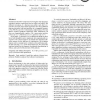Free Online Productivity Tools
i2Speak
i2Symbol
i2OCR
iTex2Img
iWeb2Print
iWeb2Shot
i2Type
iPdf2Split
iPdf2Merge
i2Bopomofo
i2Arabic
i2Style
i2Image
i2PDF
iLatex2Rtf
Sci2ools
POPL
2016
ACM
2016
ACM
Pushdown control-flow analysis for free
Traditional control-flow analysis (CFA) for higher-order languages introduces spurious connections between callers and callees, and different invocations of a function may pollute each other’s return flows. Recently, three distinct approaches have been published that provide perfect call-stack precision in a computable manner: CFA2, PDCFA, and AAC. Unfortunately, implementing CFA2 and PDCFA requires significant engineering effort. Furthermore, all three are computationally expensive. For a monovariant analysis, CFA2 is in O(2n ), PDCFA is in O(n6 ), and AAC is in O(n8 ). In this paper, we describe a new technique that builds on these but is both straightforward to implement and computationally inexpensive. The crucial insight is an unusual state-dependent allocation strategy for the addresses of continuations. Our technique imposes only a constant-factor overhead on the underlying analysis and costs only O(n3 ) in the monovariant case. We present the intuitions behind this develo...
Related Content
| Added | 09 Apr 2016 |
| Updated | 09 Apr 2016 |
| Type | Journal |
| Year | 2016 |
| Where | POPL |
| Authors | Thomas Gilray, Steven Lyde, Michael D. Adams 0001, Matthew Might, David Van Horn |
Comments (0)

